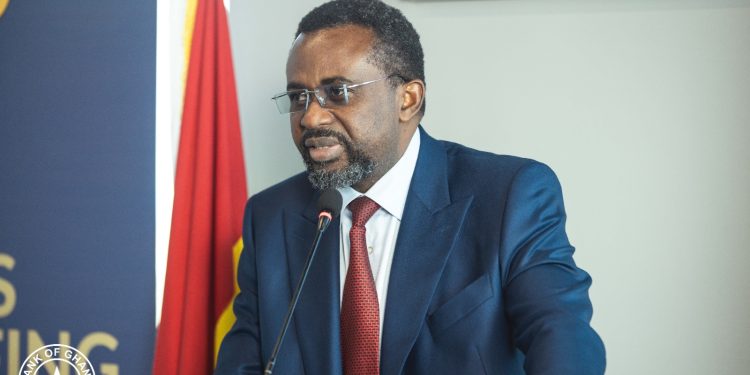Editorial: Recapitalising the Bank of Ghana Is Not a Choice; It’s an Economic Emergency
- The numbers are stark. The implications are even starker.
Over the past three years, the Bank of Ghana (BoG) is said to have recorded cumulative losses exceeding GHC80 billion if the GHC10 billion loss of 2024 alleged is true. This means in 2022 alone, it lost GHC60.8 billion. In 2023, another GHC10.5 billion was shed. And now, sources have alleged that the central bank has bled yet again some more than GHC10 billion again in 2024. This isn’t simply a financial footnote but it is a fundamental threat to Ghana’s economic governance.
Let us be clear: recapitalising the BoG is no longer an academic discussion. It is an economic emergency. If the central bank cannot credibly carry out its mandate—whether that’s fighting inflation, defending the cedi, or supervising the banking sector then what we are left with is a fragile economy operating on borrowed time and diminishing trust.
This Crisis Has a History
Much of the central bank’s current financial state can be traced to its role in the Domestic Debt Exchange Programme (DDEP), where it absorbed the lion’s share of losses to support government debt restructuring. While that may have been politically expedient and fiscally necessary, the cost to institutional independence has been severe.
The BoG took a 50% haircut on over GHC64 billion of government debt—more than any commercial bank or investor. In doing so, it played the role of both firefighter and firewood: dousing the flames of fiscal insolvency while becoming kindling for its own credibility crisis.
Losses Aren’t the Problem. Inaction Is.
Globally, central banks have posted losses before. The Swiss National Bank, the U.S. Federal Reserve, and the Bank of England have all run negative equity positions. But those institutions operate in mature economies with deep fiscal buffers, political stability, and high institutional trust. Ghana does not.
Here, when the central bank loses credibility, inflation expectations spiral. The cedi weakens. Investor confidence falters. And the very instrument meant to stabilise the economy becomes a symbol of its fragility.
What makes Ghana’s case dangerous is not just the balance sheet deficit, it’s the lack of urgency in fixing it.
Recapitalisation Must Be Strategic—and Bold
We agree with Dr. Richmond Atuahene and others who have called for immediate recapitalisation of the BoG, not just to restore its finances, but to restore trust. Parliament must supervise the process to ensure transparency and shield it from political interference.
This is not the time for incrementalism or vague promises. This is the time for bold, innovative strategies:
- Diaspora Bonds: Ghana receives over $4.5 billion annually in remittances. A well-structured diaspora bond marketed with clarity, integrity, and competitive terms can unlock patriotic capital from Ghanaians abroad.
- Resource-Backed Securities: With gold, lithium, and bauxite under our soil, we must turn latent wealth into fiscal resilience. If done transparently, securitising future revenues is not mortgaging the future it’s responsibly financing the present.
- Divestment of Non-Core Assets: BoG owns a 12% stake in ADB and other real estate holdings. These should be strategically offloaded to free up capital without affecting the Bank’s core mandate.
Recapitalisation isn’t about optics it’s about operational capacity. Without it, BoG will remain a symbolic shell: visible but ineffective.
Beyond the Money: A Need for Structural Reform
But capital alone won’t be enough. Recapitalisation must be paired with institutional reform. The lines between fiscal and monetary roles must be clearly redrawn. Legal guardrails must be fortified to protect BoG’s independence. And its mandate must be refocused to prevent future entanglements in fiscal bailouts.
We must enshrine a rules-based recapitalisation framework that grows with nominal GDP and ring-fences future profits for capital restoration not political redistribution.
The Clock Is Ticking
If we delay, we do so at our peril. Investors are watching. Ghanaians are questioning. And markets are responding. A weak central bank doesn’t just weaken an economy it undermines its sovereignty.
The BoG’s recapitalisation is not just a financial necessity. It is a test of our institutional maturity. Of whether Ghana can reform not only under pressure, but with foresight.
The Bank of Ghana may be bleeding but it is not beyond saving. What it needs is not another statement, but action. Deliberate, transparent, and swift.
The credibility of Ghana’s monetary system and the stability of its economy depend on it.










insightful
in a recent report you read in Parliament, you said that the BOG is policy solvent meaning you can still do your core work even with negative equity. Pls don’t change your tune now. go sell your headqtrs and divest from many non core activities to free capital for use. you can not burden us with your imprudence
what really worries me is what the then finance minister did with all the borrowing. were the loans not approved by the then hung parliament? going forward in instutional reforms would suggest a very very strong debt management office in the ministry of finance or the bank.